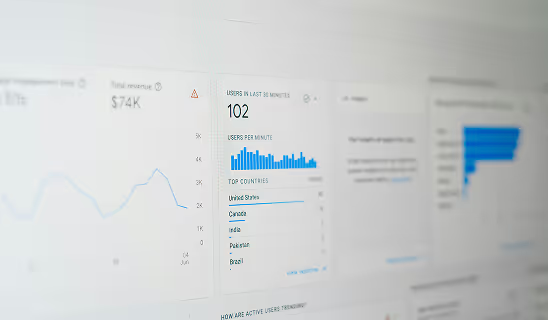Mastering Digital Marketing: Essential Strategies for Small Businesses
03/11/2025
Social Media Marketing
In today’s digital-first world, small businesses need smart, effective marketing strategies to stand out—here’s how to master digital marketing and achieve long-term success.

In today's digital age, the success of small businesses hinges on their ability to navigate the ever-evolving landscape of online marketing. With consumers increasingly turning to the internet to discover, engage, and make purchasing decisions, it's crucial for small businesses to master the art of digital marketing. Building on our previous guide to finding the best marketing agency, this follow-up blog will delve into the world of digital marketing and provide essential strategies for small businesses looking to thrive in the digital realm.
.png)


Navigating the Digital Marketing Landscape: Essential Strategies for Small Businesses



Content Outline
Section 1: Understanding the Digital Marketing Landscape for Small Businesses: In this section, we will explore the various digital marketing channels and their benefits. From search engine optimization (SEO) to social media marketing and beyond, we'll uncover the power of these channels in reaching and engaging your target audience. By understanding the digital marketing landscape, you can make informed decisions about which channels are best suited for your business.
Section 2: Crafting a Winning Digital Marketing Strategy: A successful digital marketing strategy is the backbone of any thriving small business. In this section, we'll guide you through the key elements of a winning strategy. From identifying your target audiences and creating buyer personas to setting clear goals and objectives, you'll learn how to develop a strategic roadmap for your digital marketing efforts.
Section 3: Leveraging Search Engine Optimization (SEO) for Small Businesses: SEO is a fundamental pillar of digital marketing. We'll dive into the world of SEO, unraveling the techniques and strategies that can boost your website's organic visibility. From keyword research to on-page optimization, we'll provide practical tips to help you climb the search engine rankings and attract valuable organic traffic.
Section 4: Mastering Social Media Marketing for Small Businesses: Social media has revolutionized the way businesses connect with their audiences. In this section, we'll explore the benefits of social media marketing for small businesses and share strategies for building a strong social media presence. From creating engaging content to running effective ad campaigns, you'll discover how to leverage the power of social media to expand your reach and engage with your target customers.
Section 5: Embracing Content Marketing and Blogging: Content marketing has become a driving force in digital marketing. We'll delve into the world of content marketing and explore how creating valuable content can establish your brand as an industry authority. We'll also discuss the benefits of blogging and provide tips for developing a successful blogging strategy that drives organic traffic and nurtures customer relationships.
Section 6: Maximizing Paid Advertising Opportunities: Paid advertising offers immense opportunities for small businesses to reach their target audience with precision. In this section, we'll discuss the various paid advertising options available, from pay-per-click (PPC) campaigns to display ads and social media advertising. We'll provide insights and tips to help you optimize your ad targeting and maximize the ROI of your paid advertising efforts.
Mastering digital marketing is no longer optional for small businesses—it's essential for survival and growth. By embracing the strategies and insights shared in this blog, you'll be equipped to navigate the digital marketing landscape with confidence and drive your business towards success. Stay tuned for the upcoming sections, where we'll delve into each strategy in detail and provide actionable steps to help you achieve digital marketing mastery.
Unleashing the Power of Digital Marketing: A Roadmap for Small Businesses
In today's digital age, the opportunities for small businesses to thrive and grow have expanded exponentially. The key lies in understanding and harnessing the potential of digital marketing. In this section, we will explore the vast landscape of digital marketing and guide you through the essential strategies that can propel your small business towards success. By gaining a comprehensive understanding of the digital marketing channels available and their benefits, you'll be equipped to make informed decisions about where to invest your time and resources.
Exploring the Digital Marketing Channels:
- Search Engine Optimization (SEO): Dive into the world of SEO and discover how optimizing your website can improve your organic search visibility. Learn about keyword research, on-page optimization, and the importance of creating high-quality content that resonates with both search engines and your target audience.
- Social Media Marketing: Explore the power of social media and how it can amplify your brand's reach and engagement. From establishing a strong presence on platforms like Facebook, Instagram, and LinkedIn to running targeted ad campaigns, learn how to effectively leverage social media to connect with your audience and drive meaningful interactions.
- Email Marketing: Discover the potential of email marketing in nurturing customer relationships and driving conversions. Learn how to build an engaged subscriber list, craft compelling email campaigns, and personalize your messages to deliver value and build trust with your audience.
- Content Marketing: Unlock the power of content marketing to establish your brand as an authority in your industry. Explore the benefits of creating valuable content through blog posts, videos, infographics, and more. Learn how to develop a content strategy that aligns with your business goals and attracts and engages your target audience.
- Pay-Per-Click (PPC) Advertising: Delve into the world of paid advertising and explore the potential of PPC campaigns. From search ads on platforms like Google Ads to display ads and remarketing campaigns, discover how to maximize your ad spend and drive targeted traffic to your website or landing pages.
- Influencer Marketing: Learn how to tap into the influence of industry experts and social media influencers to expand your brand's reach and credibility. Understand the strategies for identifying and partnering with the right influencers who align with your brand values and can effectively promote your products or services.
Benefits of Digital Marketing for Small Businesses:
- Increased Brand Visibility: Digital marketing allows small businesses to compete on a level playing field with larger brands, as online platforms offer equal opportunities for exposure and visibility.
- Targeted Audience Reach: With digital marketing, you can precisely target your audience based on demographics, interests, and behaviors, ensuring that your message reaches the right people at the right time.
- Cost-Effectiveness: Compared to traditional marketing channels, digital marketing often offers a more cost-effective approach, allowing small businesses to optimize their budget and achieve significant returns on investment.
- Enhanced Customer Engagement: Through digital marketing, you can foster meaningful interactions with your customers, build relationships, and provide personalized experiences that drive loyalty and repeat business.
- Measurable Results: Digital marketing provides robust analytics and tracking capabilities, enabling you to measure the effectiveness of your campaigns and make data-driven decisions for continuous improvement.
Understanding the digital marketing landscape is crucial for small businesses seeking to thrive in today's digital-driven world. By exploring the various digital marketing channels and recognizing their benefits, you can make informed decisions about where to focus your efforts. In the upcoming sections, we will delve deeper into each digital marketing strategy, providing actionable tips and insights to help you navigate this exciting terrain and propel your small business towards success.
Building a Solid Foundation: Key Elements of a Successful Digital Marketing Strategy
A successful digital marketing strategy serves as the compass that guides your small business towards its goals in the digital landscape. In this section, we'll explore the essential elements that form the foundation of a winning strategy. By understanding these key components and implementing them effectively, you can create a roadmap that aligns your digital marketing efforts with your business objectives and drives measurable results.
Defining Your Objectives:
- Start by clearly defining your digital marketing objectives. Are you looking to increase brand awareness, drive website traffic, generate leads, boost sales, or all of the above? Establishing specific and measurable goals will provide focus and direction for your strategy.
Identifying Your Target Audience:
- Understanding your target audience is crucial for effective digital marketing. Define your buyer personas, which are fictional representations of your ideal customers. Consider their demographics, interests, pain points, and online behavior. This insight will guide your content creation, messaging, and targeting efforts.
Conducting Competitor Research:
- Analyze your competitors' digital marketing strategies to gain insights into their strengths, weaknesses, and areas of opportunity. Identify gaps in the market and areas where you can differentiate your small business.
Selecting the Right Digital Marketing Channels:
- Based on your objectives, target audience, and competitor analysis, determine the digital marketing channels that are most relevant and effective for your business. This could include SEO, social media, email marketing, content marketing, paid advertising, or a combination of these channels.
Creating Engaging Content:
- Content lies at the heart of any successful digital marketing strategy. Develop a content plan that aligns with your target audience's interests and addresses their pain points. Create valuable and engaging content that educates, entertains, or inspires your audience and builds trust in your brand.
Implementing Conversion Optimization Techniques:
- Conversion optimization focuses on maximizing the number of visitors who take desired actions on your website, such as making a purchase or filling out a lead form. Implement techniques like clear call-to-actions, intuitive website design, A/B testing, and data analysis to optimize your conversion rates.
Establishing Key Performance Indicators (KPIs):
- Define the KPIs that will measure the success of your digital marketing efforts. These may include metrics such as website traffic, conversion rates, engagement on social media, email open rates, or revenue generated. Regularly track and analyze these metrics to evaluate the effectiveness of your strategy.
Developing a Realistic Budget:
- Determine a realistic budget that aligns with your goals and resources. Allocate funds to different digital marketing channels based on their potential to deliver the desired results. Remember to leave room for testing, optimization, and adjustments as you gain insights from your campaigns.
Crafting a winning digital marketing strategy requires careful planning and consideration of key elements. By defining your objectives, understanding your target audience, conducting competitor research, selecting the right channels, creating engaging content, implementing conversion optimization techniques, establishing KPIs, and setting a realistic budget, you can build a strong foundation for your digital marketing efforts. In the upcoming sections, we'll delve deeper into each of these elements, providing actionable tips and strategies to help you execute your digital marketing strategy effectively and achieve your business goals.
Climbing the Ranks: Unleashing the Power of SEO for Small Business Success












Search Engine Optimization (SEO) is a critical component of any successful digital marketing strategy. By optimizing your website for search engines, you can improve your organic visibility, drive targeted traffic, and establish a strong online presence. In this section, we'll delve into the world of SEO and provide valuable insights and techniques specifically tailored for small businesses. From keyword research to on-page optimization, we'll equip you with the tools and knowledge needed to climb the search engine rankings and outshine your competitors.
Conducting Keyword Research:
- Start by conducting thorough keyword research to identify the phrases and terms your target audience is using to search for products or services related to your business. Utilize keyword research tools to uncover high-volume and relevant keywords that align with your content and business offerings.
Optimizing On-Page Elements:
- Optimize your website's on-page elements to enhance its visibility in search engine results. This includes optimizing meta titles, meta descriptions, headings, and URL structures to incorporate target keywords and provide a clear and concise description of your page's content.
Creating High-Quality and Relevant Content:
- Content is king when it comes to SEO. Craft high-quality, informative, and engaging content that not only satisfies the needs of your target audience but also aligns with search engine guidelines. Develop a content strategy that incorporates target keywords naturally and provides valuable information that positions your business as an industry expert.
Building High-Quality Backlinks:
- Backlinks, or links from other reputable websites pointing to yours, are an essential ranking factor for search engines. Focus on building high-quality backlinks by creating valuable content that other websites would want to link to. Engage in outreach efforts and build relationships with industry influencers, bloggers, and publications to earn authoritative backlinks.
Optimizing for Local SEO:
- If your small business operates in a specific location or serves a local audience, optimizing for local SEO is crucial. Ensure your website includes relevant local keywords, claim your Google My Business listing, and encourage customers to leave reviews. This will help your business appear in local search results and attract customers in your area.
Monitoring Performance and Making Adjustments:
- Regularly monitor your website's performance using tools like Google Analytics and Search Console. Analyze key metrics such as organic traffic, keyword rankings, and user behavior to identify areas for improvement. Make adjustments to your SEO strategy based on these insights to continuously optimize your website's performance.
Staying Up-to-Date with SEO Best Practices:
- The world of SEO is constantly evolving. Stay informed about the latest algorithm updates and industry best practices to ensure your SEO efforts remain effective. Follow reputable SEO blogs, participate in industry forums, and engage with SEO communities to stay ahead of the curve.
SEO is a powerful tool for small businesses to increase their online visibility, attract targeted traffic, and outperform their competitors. By conducting keyword research, optimizing on-page elements, creating high-quality content, building authoritative backlinks, optimizing for local SEO, monitoring performance, and staying up-to-date with best practices, you can unleash the power of SEO and drive significant results for your small business. In the next section, we'll explore the world of social media marketing and how it can amplify your brand's reach and engagement. Get ready to harness the potential of social media for your small business success.
Building a Strong Social Presence: Unleashing the Power of Social Media Marketing
Social media has transformed the way businesses connect with their audience, making it an indispensable part of any comprehensive digital marketing strategy. For small businesses, social media marketing offers a cost-effective and powerful way to increase brand awareness, engage with customers, and drive business growth. In this section, we'll explore the world of social media marketing and provide practical insights and strategies tailored specifically for small businesses. From establishing a strong presence to running effective ad campaigns, get ready to harness the power of social media and propel your small business towards success.
Choosing the Right Social Media Platforms:
- Start by identifying the social media platforms that align with your target audience and business goals. Consider factors such as demographics, user behavior, and platform features. Focus your efforts on platforms where your target audience is most active.
Creating a Compelling Social Media Strategy:
- Develop a well-defined social media strategy that aligns with your business objectives. Set specific goals, whether it's increasing brand awareness, driving website traffic, generating leads, or fostering customer engagement. Outline your content themes, posting frequency, and engagement strategies to guide your social media efforts.
Crafting Engaging Content:
- Content is key to capturing your audience's attention and driving engagement on social media. Create a mix of content formats, including captivating visuals, videos, informative articles, and user-generated content. Tailor your content to each platform, utilizing features such as Instagram Stories, Facebook Live, or LinkedIn articles.
Building a Community and Engaging with Your Audience:
- Social media is all about building relationships and fostering a community around your brand. Engage with your audience by responding to comments, messages, and mentions. Encourage user-generated content, run contests or polls, and actively participate in conversations related to your industry or niche.
Running Effective Social Media Ad Campaigns:
- Amplify your reach and target specific audience segments through social media advertising. Utilize the targeting options available on platforms like Facebook Ads, Instagram Ads, LinkedIn Ads, or Twitter Ads to reach your ideal customers. Experiment with different ad formats and optimize your campaigns based on data and performance metrics.
Monitoring and Analyzing Results:
- Regularly monitor your social media performance using analytics tools provided by the platforms or third-party tools. Track metrics such as reach, engagement, click-through rates, and conversions. Analyze the data to identify trends, understand what resonates with your audience, and make data-driven decisions for future content and campaign strategies.
Staying Authentic and Building Brand Trust:
- Authenticity and transparency are crucial for building trust and establishing a strong brand presence on social media. Be genuine in your interactions, share behind-the-scenes glimpses, and showcase the human side of your business. Respond to feedback and address customer concerns promptly and professionally.
Social media marketing offers immense opportunities for small businesses to increase brand visibility, engage with customers, and drive business growth. By choosing the right platforms, crafting a compelling strategy, creating engaging content, building a community, running effective ad campaigns, monitoring results, and staying authentic, you can harness the power of social media and make a significant impact. In the next section, we'll explore the world of content marketing and blogging, providing valuable insights on how to establish your brand as an industry authority and drive organic traffic to your small business website. Get ready to unlock the potential of content marketing for your business success.
Want to learn more about brand platforms, Brand Strategy and Brand Identity? Keep reading!
If you need help with your companies brand strategy and identity, contact us for a free custom quote.
Fueling Growth with Valuable Content: Unleashing the Power of Content Marketing

In today's digital landscape, content marketing has emerged as a powerful strategy for small businesses to establish their brand, engage with their target audience, and drive organic traffic to their websites. Through valuable and informative content, businesses can position themselves as industry authorities and build trust with their customers. In this section, we'll delve into the world of content marketing and blogging, exploring the benefits and strategies that can help your small business leverage the power of content to fuel growth and success.
Understanding the Benefits of Content Marketing:
- Discover the numerous benefits of content marketing for small businesses. From increasing brand awareness and driving organic traffic to nurturing customer relationships and boosting conversions, content marketing can be a game-changer for your business.
Developing a Content Strategy:
- Start by developing a comprehensive content strategy that aligns with your business goals and target audience. Define your content themes, formats, and channels. Consider the interests and pain points of your audience, and craft content that provides value, educates, and solves their problems.
Creating Valuable and Engaging Content:
- Explore different content formats, such as blog articles, videos, infographics, podcasts, or ebooks. Develop content that educates, entertains, or inspires your audience. Utilize storytelling techniques, incorporate visuals, and optimize for readability to make your content engaging and shareable.
Optimizing Content for Search Engines:
- Implement search engine optimization (SEO) techniques to optimize your content for search engines. Conduct keyword research and strategically incorporate keywords into your content. Optimize meta tags, headings, and URL structures. Focus on creating high-quality, user-friendly content that satisfies both your audience and search engine algorithms.
Promoting Your Content:
- Content promotion is essential to ensure your content reaches a wider audience. Utilize social media platforms, email newsletters, and online communities to promote your content. Engage with influencers, collaborate with industry partners, and participate in relevant discussions to expand your content's reach.
Nurturing Customer Relationships through Email Marketing:
- Email marketing is a valuable tool for nurturing customer relationships and driving conversions. Build an email subscriber list and deliver personalized and relevant content to your subscribers. Use email automation to send targeted campaigns based on customer segments and behaviors.
Analyzing and Iterating Based on Data:
- Regularly analyze the performance of your content using website analytics tools. Track metrics such as page views, time on page, bounce rate, and conversion rates. Gain insights into what content resonates with your audience and make data-driven decisions to optimize your content strategy.
Repurposing and Refreshing Content:
- Extend the lifespan of your content by repurposing it into different formats. Convert blog articles into videos, infographics, or podcasts. Refresh and update older content to keep it relevant and drive additional traffic.
Content marketing and blogging are powerful strategies for small businesses to establish their brand authority, engage with their audience, and drive organic traffic. By developing a comprehensive content strategy, creating valuable and engaging content, optimizing for search engines, promoting your content, nurturing customer relationships through email marketing, analyzing data, and repurposing content, you can harness the power of content marketing to fuel growth and success. In the next section, we'll explore the world of paid advertising opportunities and how small businesses can maximize their advertising efforts. Get ready to unlock the potential of paid advertising for your business's growth.
Accelerating Growth: Unleashing the Power of Paid Advertising for Small Businesses
In the competitive realm of digital marketing, mastering essential strategies is paramount for small businesses aiming to achieve success with Google Ads in Brisbane. By understanding the key components of effective online advertising, businesses can unlock their potential for growth and establish a prominent online presence.
One crucial strategy for small businesses is to conduct thorough keyword research. By identifying the most relevant and high-performing keywords for their target audience in Brisbane, businesses can optimize their Google Ads campaigns to reach the right customers at the right time. This strategic approach maximizes the chances of conversions and minimizes unnecessary ad spend.
Furthermore, crafting compelling ad copy is another vital aspect of mastering digital marketing with Google Ads. Creating attention-grabbing headlines and persuasive descriptions can entice users to click on the ads, increasing the chances of driving traffic to the business website. Additionally, tailoring the ad copy to reflect the unique selling points and value propositions of the business helps to differentiate it from competitors, attracting potential customers in the Brisbane market.
Another effective strategy is leveraging audience targeting options provided by Google Ads. By defining specific demographics, interests, and behaviors of the target audience in Brisbane, businesses can ensure their ads are displayed to the most relevant users. This precise targeting approach optimizes the budget utilization and enhances the overall campaign performance, ultimately leading to higher conversion rates.
Understanding the Benefits of Paid Advertising:
- Discover the advantages of paid advertising and how it can complement your organic marketing efforts. From instant visibility and precise targeting to measurable results and scalability, paid advertising offers a range of benefits that can propel your business forward.
Choosing the Right Advertising Platforms:
- Identify the advertising platforms that align with your target audience and business goals. Consider popular platforms such as Google Ads, Facebook Ads, Instagram Ads, LinkedIn Ads, or Twitter Ads. Each platform has unique features, targeting options, and audience demographics to help you tailor your advertising campaigns.
Defining Your Advertising Goals:
- Clearly define your advertising goals to guide your strategy. Whether you aim to drive website traffic, generate leads, increase brand awareness, or boost sales, setting specific and measurable goals will enable you to track progress and optimize your campaigns accordingly.
Crafting Compelling Advertisements:
- Create attention-grabbing and persuasive advertisements that compel your target audience to take action. Craft compelling headlines, use captivating visuals, and include a clear call-to-action. Tailor your messaging to resonate with your audience's pain points, desires, and motivations.
Utilizing Targeting and Segmentation:
- Leverage the targeting and segmentation options provided by the advertising platforms to ensure your ads reach the most relevant audience. Define your target audience based on demographics, interests, behavior, or even specific retargeting campaigns to re-engage with past website visitors.
Optimizing Ad Campaigns:
- Continuously monitor and optimize your ad campaigns to improve performance. Test different ad variations, adjust targeting parameters, and refine your bidding strategies based on data and insights. Utilize A/B testing to compare different elements of your ads and landing pages for optimal results.
Tracking and Analyzing Results:
- Use tracking tools and analytics to measure the effectiveness of your paid advertising campaigns. Monitor key performance indicators (KPIs) such as click-through rates (CTRs), conversion rates, cost per acquisition (CPA), and return on ad spend (ROAS). Analyze the data to identify trends, make data-driven decisions, and refine your advertising strategy.
Budgeting and Allocating Resources:
- Establish a realistic budget for your paid advertising efforts based on your business goals and available resources. Allocate your budget across different platforms and campaigns based on their potential to deliver the desired results. Continuously evaluate and adjust your budget as needed for optimal performance.
Exploring Remarketing and Retargeting:
- Leverage the power of remarketing and retargeting to re-engage with users who have previously interacted with your brand. Create customized ads that target these audiences, reminding them of your products or services and enticing them to take further action.
Paid advertising can be a game-changer for small businesses, providing the opportunity to reach their target audience effectively and accelerate business growth. By choosing the right advertising platforms, defining your goals, crafting compelling advertisements, utilizing targeting and segmentation, optimizing campaigns, tracking and analyzing results, budgeting wisely, and exploring remarketing and retargeting, you can maximize the potential of paid advertising for your business's success. In the next section, we'll guide you through the evaluation process of selecting the best marketing agency for your small business. Get ready to make an informed.
Sealing the Deal: Making an Informed Decision and Embarking on Your Marketing Journey

Congratulations! You've conducted thorough research, evaluated marketing agencies, and now it's time to make the final decision. In this section, we'll guide you through the steps of finalizing your choice and getting started with your selected marketing agency. By following these steps, you'll ensure a smooth transition and set the stage for a successful partnership that propels your small business to new heights of marketing success.
Review and Compare Your Findings:
- Take a moment to review the information you've gathered during your research and evaluation process. Consider the agencies' expertise, track record, pricing, communication style, and compatibility with your business goals. Compare your findings to determine which agency aligns best with your needs and aspirations.
Trust Your Gut Feeling:
- While data and research are crucial, it's also essential to trust your instincts. Reflect on the interactions you've had with each agency, the chemistry you felt, and the level of confidence they instilled in you. A strong gut feeling can often guide you towards the right decision.
Finalize the Terms and Contract:
- Once you've made your decision, it's time to finalize the terms and contract with the selected agency. Work closely with their team to establish clear expectations, deliverables, timelines, and pricing details. Ensure everything is documented in a comprehensive contract that protects both parties' interests.
Provide Clear Objectives and Share Relevant Information:
- To set your marketing agency up for success, provide them with clear objectives, goals, and any relevant information about your business. This can include details about your target audience, competitors, brand identity, and previous marketing efforts. The more information you provide, the better equipped they will be to tailor their strategies to your specific needs.
Establish Open Lines of Communication:
- Effective communication is vital throughout your partnership with the marketing agency. Set up regular meetings or check-ins to discuss progress, address any concerns, and provide feedback. Establishing open lines of communication from the start will foster a productive and collaborative working relationship.
Trust the Process and Be Patient:
- Remember that building a successful marketing campaign takes time and requires patience. Trust the expertise of your chosen agency and give them the space to implement their strategies and optimize their tactics. Be open to feedback, adjustments, and continuous improvement as you work together towards achieving your marketing goals.
Monitor Progress and Measure Results:
- Stay actively involved in monitoring the progress of your marketing campaigns. Request regular reports and updates from the agency to assess their performance against the defined metrics and KPIs. This allows you to track the effectiveness of the strategies implemented and make informed decisions based on the results.
Making the final decision and getting started with your chosen marketing agency is an exciting milestone in your small business journey. By reviewing and comparing your findings, trusting your instincts, finalizing the terms and contract, providing clear objectives, establishing open communication, and monitoring progress, you are setting the stage for a successful partnership. Embrace the journey ahead with confidence and be prepared to witness the transformative impact of professional marketing on your small business's growth and success.
Share your experience with finding and partnering with a marketing agency in the comments below. We'd love to hear your success stories, challenges, and any additional insights you can provide. Remember, the right marketing agency can be a game-changer for your small business, so take action and embark on your marketing journey today!

Sloane Avery
As entrepreneurs, they’ve built and scaled their own ventures from zero to millions. They’ve been in the trenches, navigating the chaos of high-growth phases, making the hard calls, and learning firsthand what actually moves the needle. That’s what makes us different—we don’t just “consult,” we know what it takes because we’ve done it ourselves.
Want to learn more about brand platform?
If you need help with your companies brand strategy and identity, contact us for a free custom quote.
We do great work. And get great results.
+2.3xIncrease in revenue YoY
+126%Increase in repurchase rate YoY








+93%Revenue growth in first 90 days
+144% Increase in attributed revenue








+91%Increase in conversion rate
+46%Increase in AOV








+200%Increase in conversion rate
+688%Increase in attributed revenue












